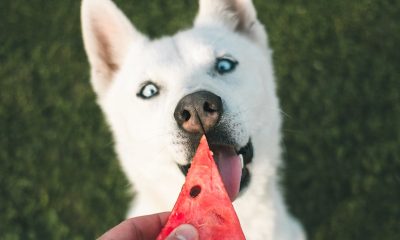Nutrition & Supplements
The Importance of Calcium Supplements for Your Dog’s Health

Are you ready to give your furry friend the best care possible?
Discover the importance of calcium supplements for your dog’s health. Strong bones, dental health, and proper muscle function all rely on adequate calcium intake.
Learn the signs of calcium deficiency and why pregnant and nursing dogs need extra support.
Find out how to choose the right calcium supplement and incorporate calcium-rich foods into your dog’s diet.
Take the first step towards a healthier, happier dog today.
The Role of Calcium in Your Dog’s Health
You should know that the role of calcium in your dog’s health is crucial for maintaining strong bones and teeth. But did you know that calcium offers many other benefits for your furry friend’s overall health? Calcium isn’t just important for strong bones, it also plays a vital role in nerve function and transmission.
Calcium is essential for maintaining the integrity and strength of your dog’s bones and teeth. It helps to prevent bone loss and promotes healthy bone growth. Additionally, calcium is important for muscle contraction and blood clotting, ensuring that your dog’s body functions properly.
But calcium’s role doesn’t stop there. It’s also involved in the transmission of nerve impulses throughout your dog’s body. Nerve cells rely on calcium to send signals, allowing your dog’s brain to communicate with different parts of its body. Without adequate calcium, these signals may not be transmitted effectively, leading to issues with muscle control and coordination.
To ensure that your dog gets enough calcium, you can provide a balanced diet that includes calcium-rich foods like dairy products, fish, and leafy green vegetables. You can also consider calcium supplements recommended by your veterinarian. Remember, maintaining proper calcium levels is essential for your dog’s overall health and well-being.
Understanding the Importance of Strong Bones for Your Dog
It’s crucial for your furry friend’s overall health that they understand the importance of strong bones. Just like humans, dogs need strong bones to support their bodies and maintain mobility. Regular exercise plays a vital role in promoting bone health for your dog. When your dog engages in physical activity, it helps to strengthen their bones and increase bone density. Exercise also helps to improve the circulation of blood to their bones, which aids in delivering essential nutrients and oxygen for bone growth and repair.
Another key factor in maintaining strong bones for your dog is the role of vitamin D in calcium absorption. Vitamin D plays a crucial role in the absorption of calcium from the food your dog consumes. Calcium is vital for bone health, and without adequate levels of vitamin D, your dog may not be able to absorb the calcium properly. Sunlight is a natural source of vitamin D, and spending time outdoors allows your dog to soak up the sun’s rays and produce this important vitamin.
How Calcium Supports Dental Health in Dogs
Your dog’s dental health greatly benefits from the presence of calcium in their diet. Calcium plays a vital role in maintaining strong teeth and gums, preventing dental issues such as tooth decay and gum disease.
Here are four key reasons why calcium is essential for your dog’s dental health:
- Strong Teeth: Calcium helps in the formation and development of strong teeth. It ensures the proper mineralization of teeth, making them resistant to cavities and fractures.
- Healthy Gums: Adequate calcium intake promotes healthy gums by strengthening the connective tissues that hold the teeth in place. This helps prevent gum inflammation and periodontal disease.
- Improved Digestion: Calcium supports proper digestion in dogs. It helps in the contraction of muscles in the digestive tract, ensuring efficient food movement and nutrient absorption.
- Coat and Skin Health: Calcium also plays a role in maintaining healthy coat and skin in dogs. It helps in the synthesis of keratin, a protein that contributes to the strength and shine of the coat. Additionally, calcium supports the production of sebum, a natural oil that keeps the skin moisturized and prevents dryness.
To ensure your dog receives an adequate amount of calcium, provide them with a balanced diet that includes calcium-rich foods such as dairy products, leafy greens, and bone meal supplements. Regular veterinary check-ups can also help monitor your dog’s dental health and address any concerns early on.
The Connection Between Calcium and Muscle Function in Dogs
Calcium supports your dog’s muscle function, helping them maintain strength and mobility. It plays a crucial role in muscle growth and contraction, ensuring that your furry friend can move and play without any issues. But did you know that calcium absorption is just as important as the intake? Without proper absorption, your dog may not be getting the full benefits of this essential mineral.
To understand the significance of calcium absorption, let’s take a look at the following table:
| Calcium-rich Foods | Calcium Absorption |
|---|---|
| Dairy products | High |
| Leafy greens | Moderate |
| Fish | Moderate |
| Beans | Low |
| Grains | Low |
As you can see, certain foods have higher calcium absorption rates than others. This means that choosing the right food for your dog is crucial in ensuring they receive the maximum benefits of calcium for their muscle function. Including a variety of calcium-rich foods in their diet can help promote muscle growth and maintenance.
Signs of Calcium Deficiency in Dogs
If you notice that your dog is experiencing muscle spasms or weakness, it’s important to consult a veterinarian as these could be signs of calcium deficiency.
Calcium is an essential mineral that plays a crucial role in your dog’s overall health and well-being. A deficiency in calcium can lead to a range of symptoms that can negatively impact your furry friend’s quality of life.
Here are four key symptoms to watch out for:
- Muscle spasms: Dogs with calcium deficiency may experience involuntary muscle contractions or spasms. These can be painful and affect their ability to move freely.
- Weakness: Your dog may appear lethargic or have difficulty performing activities they once enjoyed. They might struggle to jump, run, or even walk properly.
- Bone fractures: Calcium is vital for maintaining strong bones. A lack of calcium can weaken the skeletal system, making your dog more prone to fractures or bone deformities.
- Dental problems: Calcium deficiency can also affect your dog’s teeth. They may develop dental issues like loose teeth, gum disease, or even tooth loss.
If your dog is showing any of these symptoms, it’s crucial to consult a veterinarian for proper diagnosis and treatment. Treating calcium deficiency may involve dietary changes, calcium supplements, or other interventions recommended by your vet.
The Benefits of Calcium Supplements for Senior Dogs
When it comes to your senior dog, incorporating calcium supplements into their diet can significantly improve their bone strength and overall health as they age. As dogs get older, their calcium intake and bone density tend to decrease, which can lead to weakened bones and an increased risk of fractures. By providing your furry friend with the right amount of calcium, you can help maintain their bone health and prevent potential health issues.
Calcium plays a crucial role in maintaining strong bones and teeth, but its benefits go beyond that. Adequate calcium intake can also have a positive impact on joint health in senior dogs. As they age, dogs may develop joint problems, such as arthritis or hip dysplasia. Calcium helps support joint function and can alleviate joint pain and stiffness, allowing your senior dog to move comfortably and enjoy their golden years.
To ensure your dog receives the appropriate amount of calcium, consider incorporating calcium-rich foods into their diet, such as dairy products, leafy greens, and fish. However, it’s important to consult with your veterinarian before adding any supplements to your dog’s diet, as they can determine the right dosage based on your dog’s specific needs.
Calcium Supplements for Growing Puppies
If you have a growing puppy, it’s important to consider calcium supplements for their health.
The optimal calcium dosage for puppies is crucial for their growth and development.
However, it’s also important to be aware of potential side effects that can occur from over-supplementation.
Optimal Calcium Dosage
You should consider increasing the calcium dosage for your growing puppy to ensure optimal bone development. Calcium plays a crucial role in the formation and maintenance of strong bones and teeth. Here are four reasons why adequate calcium supplementation is essential for your furry friend:
- Promotes healthy bone growth: Calcium is necessary for the development of a strong skeletal system in growing puppies. It helps in the formation of new bone tissue and ensures proper bone density.
- Aids in calcium absorption: Adequate calcium supplementation enhances the absorption of calcium in the body. This ensures that your puppy is getting the maximum benefit from the calcium-rich foods they consume.
- Prevents bone-related diseases: Insufficient calcium intake can lead to bone-related diseases like rickets or osteoporosis. Providing an optimal calcium dosage can help prevent these conditions and promote overall bone health.
- Supports dental health: Calcium is also essential for maintaining healthy teeth. It helps in the formation and maintenance of strong tooth enamel, reducing the risk of dental problems in your puppy.
Growth and Development
To ensure optimal growth and development in your growing puppy, it’s important to provide them with adequate calcium supplementation.
Calcium plays a vital role in bone density and the overall health of your furry friend. As puppies are rapidly growing, their bones need sufficient amounts of calcium to develop properly.
By giving your puppy the right amount of calcium, you can help promote strong and healthy bones, which are crucial for their overall well-being.
However, it’s important to note that calcium absorption can vary among different breeds and individual dogs. Consulting with your veterinarian is essential to determine the proper dosage for your specific pup.
Potential Side Effects
While calcium supplements can be beneficial for your growing puppy’s bone health, it’s important to be aware of potential side effects such as gastrointestinal upset or constipation. As a responsible dog owner, it’s crucial to consider the potential risks and long-term effects of giving your puppy calcium supplements.
Here are a few things to keep in mind:
- Consult your veterinarian: Before starting any supplements, it’s always best to consult with a professional who can provide guidance based on your puppy’s specific needs.
- Proper dosage: Giving your puppy too much calcium can lead to serious health issues. Always follow the recommended dosage provided by your veterinarian.
- Balanced diet: A well-balanced diet that includes calcium-rich foods can often meet your puppy’s nutritional needs without the need for supplements.
- Regular monitoring: Regular check-ups with your veterinarian will ensure that your puppy’s calcium levels are within the healthy range.
How Calcium Supports Joint Health in Dogs
Calcium plays a crucial role in supporting joint health in your dog. It helps maintain bone strength and mobility, ensuring your dog’s joints can function properly.
Additionally, calcium is essential for proper joint development and maintenance, helping to prevent joint disorders as your dog ages.
Bone Strength and Mobility
Make sure you incorporate regular exercise into your routine to keep your bones strong and maintain mobility. Exercise plays a crucial role in promoting bone strength and preventing conditions like osteoporosis.
In addition to exercise, it’s important to focus on maintaining proper bone density and calcium absorption. Here are four key points to consider:
- Calcium-rich diet: Ensure that you consume foods high in calcium, such as dairy products, leafy greens, and fortified foods.
- Vitamin D: This vitamin is essential for calcium absorption. Make sure to get enough sunlight exposure or consider taking supplements.
- Resistance training: Engaging in weight-bearing exercises like lifting weights or resistance bands can help improve bone density.
- Avoid smoking and excessive alcohol consumption: These habits can negatively impact bone health.
Joint Development and Maintenance
Ensuring proper joint development and maintenance is essential for your dog’s overall health and mobility. Joint flexibility plays a crucial role in your dog’s ability to move freely and comfortably. By taking proactive steps to prevent arthritis, you can help your furry friend live a happier and more active life.
One way to support your dog’s joint health is through regular exercise. Engaging in activities such as walking, swimming, and playing fetch helps to strengthen the muscles around the joints, providing stability and support. Additionally, maintaining a healthy weight for your dog is important, as excess weight puts unnecessary strain on the joints.
Another key aspect of joint maintenance is providing a balanced diet that includes essential nutrients like omega-3 fatty acids and glucosamine. These nutrients help to reduce inflammation and promote cartilage repair, ensuring optimal joint function.
Preventing Joint Disorders
By incorporating regular exercise and providing a balanced diet, you can actively work towards preventing joint disorders and supporting your dog’s overall joint health. Taking proactive measures to prevent arthritis and promote joint flexibility is crucial for ensuring your furry friend’s well-being. Here are four important steps you can take to accomplish this:
- Exercise regularly: Engaging your dog in physical activities such as walks, playtime, and agility training can help maintain joint flexibility and strengthen muscles that support the joints.
- Provide a balanced diet: Feeding your dog a nutritious diet that includes essential nutrients like Omega-3 fatty acids, glucosamine, and chondroitin can aid in joint health.
- Maintain a healthy weight: Excess weight can put additional strain on your dog’s joints, leading to joint disorders. Ensure your dog maintains a healthy weight through portion control and regular exercise.
- Consider joint supplements: Consult with your veterinarian about the possibility of incorporating joint supplements, like calcium, into your dog’s diet to further promote joint health and prevent disorders.
Calcium and Its Role in Preventing Osteoporosis in Dogs
You should increase your dog’s calcium intake to maintain strong bones and prevent osteoporosis. Calcium plays a crucial role in preventing bone fractures and ensuring proper calcium absorption in dogs. As a responsible pet owner, it’s essential to understand the importance of providing your furry friend with the necessary nutrients to support their overall health.
Osteoporosis is a condition characterized by weak and brittle bones, making dogs more susceptible to fractures. By increasing your dog’s calcium intake, you can help strengthen their bones and reduce the risk of fractures. Calcium is vital for maintaining healthy bones and teeth, as well as supporting muscle function and nerve transmission.
To ensure optimal calcium absorption in dogs, consider incorporating calcium-rich foods into their diet. Dairy products like milk, cheese, and yogurt are excellent sources of calcium. Additionally, leafy green vegetables, such as kale and spinach, are also rich in this essential mineral. If necessary, you can consult with your veterinarian to determine the appropriate calcium supplement for your dog’s specific needs.
The Link Between Calcium and Heart Health in Dogs
Understanding the important link between calcium and heart health in dogs can help you make informed decisions about your furry friend’s diet and overall well-being. Calcium plays a vital role in maintaining strong bones and teeth, but its benefits extend beyond skeletal health. Research has shown that calcium also plays a crucial role in maintaining a healthy cardiovascular system in dogs.
Here are four key benefits of calcium for your dog’s overall cardiovascular health:
- Regulates heart muscle contractions: Calcium is essential for proper muscle function, including the muscles that make up the heart. Adequate calcium levels help regulate the contractions of the heart, ensuring a steady and efficient pumping action.
- Supports heart rhythm: Calcium helps maintain a normal heart rhythm by facilitating the electrical signals that regulate heartbeats. A deficiency in calcium can lead to irregular heart rhythms, which can have serious consequences for your dog’s health.
- Prevents blood clotting: Calcium plays a crucial role in preventing excessive blood clotting. By ensuring adequate calcium levels, you can reduce the risk of blood clots forming and potentially causing heart-related issues.
- Supports blood vessel health: Calcium helps maintain the integrity of blood vessels, ensuring they remain strong and healthy. This is important for optimal blood flow and overall cardiovascular function.
Calcium Supplements for Pregnant and Nursing Dogs
When considering calcium supplements for your pregnant or nursing dog, it’s important to consult with your veterinarian to ensure their specific needs are met. Calcium is a vital mineral that plays a crucial role in the development and maintenance of healthy bones, teeth, and muscles. During pregnancy and nursing, your dog’s calcium requirements increase significantly to support the growth and development of her puppies. Your veterinarian will be able to guide you on the appropriate calcium supplement dosage for your dog based on her individual needs.
In addition to calcium supplements, it’s also important to provide your dog with calcium-rich food sources. Foods such as dairy products, leafy greens, and fish are excellent sources of calcium. Including these foods in your dog’s diet can help ensure she receives an adequate amount of calcium to support her overall health and the health of her puppies.
The Importance of Proper Calcium to Phosphorus Ratio in Dog Food
Ensuring a proper calcium to phosphorus ratio in your dog’s food is essential for their overall health. This balance is crucial for optimal mineral absorption, which is vital for maintaining strong bones and teeth.
Neglecting this ratio can lead to deficiencies or imbalances that could have long-term effects on your dog’s well-being.
Optimal Mineral Balance
Make sure you’re feeding your dog a balanced diet to maintain optimal mineral balance. When it comes to your dog’s health, it’s crucial to pay attention to their mineral intake, especially calcium. Calcium plays a vital role in your dog’s overall well-being, from maintaining strong bones and teeth to supporting nerve and muscle function. However, simply providing calcium-rich foods may not be enough to ensure optimal calcium absorption. Here are four important factors to consider:
- Balanced Calcium to Phosphorus Ratio: A proper balance between calcium and phosphorus is crucial for your dog’s health. An imbalance can lead to issues like skeletal abnormalities and poor bone development.
- Calcium Deficiency Symptoms: Keep an eye out for signs of calcium deficiency, such as muscle tremors, weakness, and difficulty walking. If you notice these symptoms, consult your veterinarian for appropriate supplementation.
- Calcium Supplements: Sometimes, your dog may require additional calcium supplements to meet their nutritional needs. Consult with your veterinarian to determine the right dosage and type of supplement for your furry friend.
- Regular Veterinary Check-ups: Regular visits to your veterinarian will ensure that your dog’s mineral levels are monitored and any deficiencies are addressed promptly.
Bone and Teeth Health
To maintain optimal bone and teeth health for your dog, ensure a proper calcium to phosphorus ratio in their food and consult with your veterinarian.
Calcium deficiency prevention is crucial to promote strong bones and teeth in your furry friend. Calcium is essential for their overall health and plays a vital role in muscle function, blood clotting, and nerve transmission. By providing a balanced diet and incorporating calcium-rich foods, you can help prevent any deficiencies.
Additionally, promoting oral hygiene is equally important. Regular brushing and dental cleanings can prevent dental diseases and maintain healthy teeth. Consult with your veterinarian to determine the appropriate calcium supplementation and dental care routine for your dog.
Together, we can ensure your dog’s bone and teeth health!
Choosing the Right Calcium Supplement for Your Dog
You should consider trying out different calcium supplements to find the one that works best for your dog. Just like humans, dogs also require calcium for healthy bones and teeth. However, not all calcium supplements are created equal, and it’s important to choose the right one for your furry friend.
Here are four things to consider when choosing a calcium supplement for your dog:
- Breed-specific requirements: Different dog breeds have different calcium requirements. Large breed dogs, such as Great Danes or St. Bernards, may need higher levels of calcium compared to smaller breeds like Chihuahuas or Pomeranians. Consider your dog’s breed and consult with your veterinarian to determine the appropriate calcium dosage.
- Form of supplement: Calcium supplements come in various forms, including tablets, chewables, powders, and liquids. Think about what would be most convenient for you and your dog. Some dogs may prefer chewable supplements, while others may find it easier to consume liquid or powdered forms.
- Source of calcium: Look for supplements that contain natural sources of calcium, such as bone meal or eggshell powder. These sources provide a more bioavailable form of calcium, making it easier for your dog’s body to absorb and utilize.
- Additional nutrients: Some calcium supplements also contain other beneficial ingredients like vitamin D, which aids in calcium absorption, or magnesium, which supports bone health. Consider whether your dog may benefit from these additional nutrients and choose a supplement that provides a well-rounded approach to their calcium needs.
Tips for Adding Calcium-Rich Foods to Your Dog’s Diet
Consider adding dairy products like yogurt or cheese to your dog’s diet for a calcium boost. Adding calcium-rich foods to your dog’s diet can have numerous benefits for their overall health and well-being.
Calcium is an essential mineral that plays a crucial role in maintaining strong bones and teeth, as well as proper muscle and nerve function. By incorporating calcium-rich foods into your dog’s diet, you can help prevent the development of bone-related issues such as osteoporosis and dental problems.
However, it’s important to take precautions when introducing new foods to your dog’s diet. Some dogs may have lactose intolerance or sensitivities to dairy products, so it’s best to consult with your veterinarian before making any dietary changes. Additionally, it’s crucial to note that calcium supplements should only be used for specific health conditions in dogs and under the guidance of a veterinarian. Excessive calcium intake can lead to health issues such as kidney stones or mineral imbalances.
Always consult with your veterinarian to determine the appropriate amount of calcium for your dog’s specific needs. By understanding the benefits and taking necessary precautions, you can help ensure your dog’s optimal health and well-being.
Frequently Asked Questions
Can Dogs Get Enough Calcium From Their Regular Diet or Do They Need Supplements?
You can give your dog enough calcium through their regular diet, but supplements can be beneficial. However, be cautious as calcium supplements can be harmful and it is possible to overdose on them.
What Are the Symptoms of Calcium Deficiency in Dogs?
Do you know the signs of calcium deficiency in dogs? It’s important to understand the causes and the role of calcium in bone health for your furry friend. Let’s dive into it!
Are Calcium Supplements Safe for Puppies?
Yes, calcium supplements are safe for puppies. They provide important benefits for their growing bodies. However, it’s crucial to consult with your veterinarian for the correct dosage to ensure their health and development.
How Does Calcium Support Joint Health in Dogs?
Calcium supports joint health in dogs by promoting strong bones and reducing the risk of fractures. It also helps with muscle function and mobility, allowing your dog to move comfortably and prevent mobility issues.
What Are Some Calcium-Rich Foods That Can Be Added to a Dog’s Diet?
To support your dog’s bone health, incorporate calcium-rich foods into their diet. These foods provide the necessary nutrients for strong bones and joints. Some examples include dairy products, leafy greens, and bone-in fish.
-

 Health Issues3 years ago
Health Issues3 years agoIdentifying and Treating Parasites in Dogs
-

 Dog Food3 years ago
Dog Food3 years agoIdentifying And Treating Dog Food Allergies
-

 Dog Training3 years ago
Dog Training3 years agoUsing Treats Effectively When Dog Training
-

 Health Issues2 years ago
Health Issues2 years agoCommon Digestive Problems in Dogs and How to Address Them
-

 Dog Training2 years ago
Dog Training2 years agoUnderstanding Fear and Anxiety in Dogs and How to Help Them
-

 Dog Training2 years ago
Dog Training2 years agoThe Role of Punishment in Dog Training: Pros and Cons
-

 Dog Food2 years ago
Dog Food2 years agoWet Vs. Dry Dog Food: Which Is Better
-

 Health Issues2 years ago
Health Issues2 years agoEssential Vitamins and Minerals for Your Dog’s Health






























































